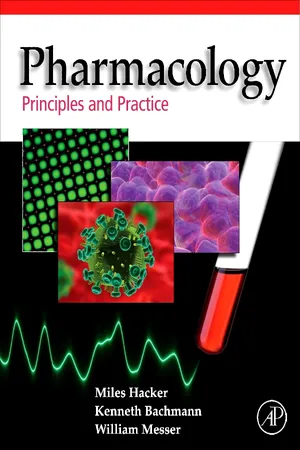
- 608 pages
- English
- ePUB (mobile friendly)
- Available on iOS & Android
About this book
Pharmacology meets the rapidly emerging needs of programs training pharmacologic scientists seeking careers in basic research and drug discovery rather than such applied fields as pharmacy and medicine.While the market is crowded with many clinical and therapeutic pharmacology textbooks, the field of pharmacology is booming with the prospects of discovering new drugs, and virtually no extant textbook meets this need at the student level. The market is so bereft of such approaches that many pharmaceutical companies will adopt Hacker et al. to help train new drug researchers.The boom in pharmacology is driven by the recent decryption of the human genome and enormous progress in controlling genes and synthesizing proteins, making new and even custom drug design possible. This book makes use of these discoveries in presenting its topics, moving logically from drug receptors to the target molecules drug researchers seek, covering such modern topics along the way as side effects, drug resistance, pharmacogenomics, and even nutriceuticals, one in a string of culminating chapters on the drug discovery process.The book is aimed at advanced undergraduates and beginning graduate students in medical, pharmacy, and graduate schools looking for a solid introduction to the basic science of pharmacology and envisioning careers in drug research.- Uses individual drugs to explain molecular actions- Full color art program explains molecular and chemical concepts graphically- Logical structure reflecting the current state of pharmacology and translational research- Covers such intricacies as drug resistance and cell death- Consistent format across chapters and pedagogical strategies make this textbook a superior learning tool
Tools to learn more effectively

Saving Books

Keyword Search

Annotating Text

Listen to it instead
Information
Table of contents
- Cover Image
- Table of Contents
- Copyright
- Dedication
- Contributors
- Preface
- Chapter 1. History of Pharmacology—From Antiquity to the Twentieth Century
- Chapter 2. Dosage Forms and Their Routes of Administration
- Chapter 3. Membranes and Drug Action
- Chapter 4. Ligand-Receptor Binding and Tissue Response
- Chapter 5. Hormesis and Pharmacology
- Chapter 6. Signal Transduction and Second Messengers
- Chapter 7. Drug Distribution
- Chapter 8. Drug Metabolism
- Chapter 9. Drug Excretion
- Chapter 10. Pharmacokinetic Modeling
- 10.1. Introduction
- 10.2. Chemical Transport
- 10.3. Absorption
- 10.4. Distribution
- 10.5. Elimination (Metabolism and Excretion)
- 10.6. Organization of Single-Dose Pharmacokinetic Model Information
- 10.7. One-Compartment Bolus IV Injection (Instantaneous Absorption) Model
- 10.7.4. Estimating Model Parameters from Measured Plasma Concentration Data
- 10.7.5. Special Cases of the One-Compartment Bolus IV (Instantaneous Absorption) Model
- 10.8. One-Compartment IV Infusion (Zero-Order Absorption) Model
- 10.9. One-Compartment First-Order Absorption Model
- 10.10. Two-Compartment Bolus IV Injection (Instantaneous Absorption) Model
- 10.11. Two-Compartment IV Infusion (Zero-Order Absorption) Model
- 10.12. Two-Compartment First-Order Absorption Model
- 10.13. Generalized Multicompartment Models
- 10.14. Multiple Dosing Models
- 10.15. Advanced Pharmacokinetic Modeling Topics
- 10.16. Summary of Key Points
- Chapter 11. Bioanalytical Tools for Drug Analysis
- Chapter 12. Drug–Drug Interactions with an Emphasis on Drug Metabolism and Transport
- Chapter 13. Adverse Drug Reactions
- Chapter 14. Risk Assessment
- Chapter 15. Drug Resistance
- Chapter 16. Ion Channels
- Chapter 17. Targeting the Cell Cycle to Kill Cancer Cells
- Chapter 18. Programmed Cell Death
- Chapter 19. Drug Discovery
- 19.1. Introduction
- 19.2. Underlying Principles
- 19.3. Drug Discovery Case Studies
- 19.4. Summary
- Chapter 20. Genomics and Proteomics in Drug Design and Discovery
- Chapter 21. The Future of Pharmacology
- Index
Frequently asked questions
- Essential is ideal for learners and professionals who enjoy exploring a wide range of subjects. Access the Essential Library with 800,000+ trusted titles and best-sellers across business, personal growth, and the humanities. Includes unlimited reading time and Standard Read Aloud voice.
- Complete: Perfect for advanced learners and researchers needing full, unrestricted access. Unlock 1.4M+ books across hundreds of subjects, including academic and specialized titles. The Complete Plan also includes advanced features like Premium Read Aloud and Research Assistant.
Please note we cannot support devices running on iOS 13 and Android 7 or earlier. Learn more about using the app